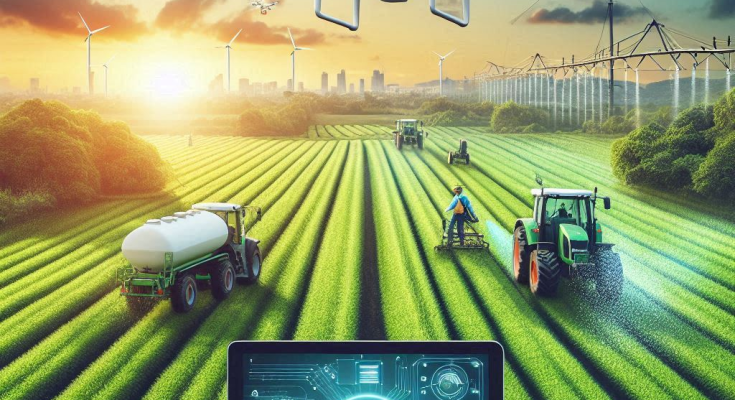Introduction
The global population is projected to reach 10 billion by 2050, placing immense pressure on the agricultural sector to enhance crop production and maximize yields. To address looming food shortages, two approaches have emerged: expanding land use through large-scale farming or leveraging technological advancements to enhance productivity on existing farmland.
Benefits of AI in Agriculture
1. Data-Based Decisions
In the modern world, data is paramount. In agriculture, organizations use data to gain meticulous insights into every aspect of the farming process. AI-powered predictive analytics plays a crucial role by providing real-time crop insights. Farmers can identify which areas need irrigation, fertilization, or pesticide treatment. Additionally, innovative practices like vertical agriculture can increase food production while minimizing resource usage.
2. Soil Health Analysis
AI helps analyze soil health, optimizing planting strategies. By understanding soil composition, moisture levels, and nutrient content, farmers can tailor their cultivation practices for better yields.
3. Precision Farming
AI-driven precision agriculture involves using sensors, drones, and satellite imagery to monitor crops. It enables targeted interventions, such as applying fertilizers or pesticides only where needed, reducing waste and environmental impact.
4. Crop Prediction
Machine learning models analyze historical data to predict crop yields, disease outbreaks, and weather patterns. Accurate predictions allow farmers to plan effectively and mitigate risks.
5. Pest and Disease Management
AI detects early signs of pests and diseases, allowing timely intervention. Whether it’s identifying a fungal infection or monitoring insect populations, AI enhances crop health.
6. Autonomous Farming Machinery
Self-driving tractors, harvesters, and drones equipped with AI algorithms perform tasks efficiently. They optimize planting, irrigation, and harvesting, reducing labor costs.
7. Supply Chain Optimization
AI streamlines the entire supply chain, from farm to table. It ensures efficient transportation, storage, and distribution of agricultural products.
Challenges and Ethical Considerations
While AI offers immense benefits, challenges remain:
- Data Privacy: Handling sensitive farm data requires robust privacy measures.
- Bias and Fairness: AI algorithms must be free from biases related to race, gender, or geography.
- Accessibility: Ensuring that small-scale farmers can access AI technologies is essential.
The Future of AI in Agriculture
As AI continues to evolve, we can expect:
- Hyper-Personalized Farming: AI tailoring recommendations based on individual farm conditions.
- Climate-Resilient Crops: AI-driven breeding for drought-resistant, pest-tolerant varieties.
- Collaboration: Farmers, researchers, and AI experts working together for sustainable agriculture.
In conclusion, AI is not just a buzzword; it’s a transformative force in agriculture. By harnessing its power, we can create a more resilient and productive food system for the future
